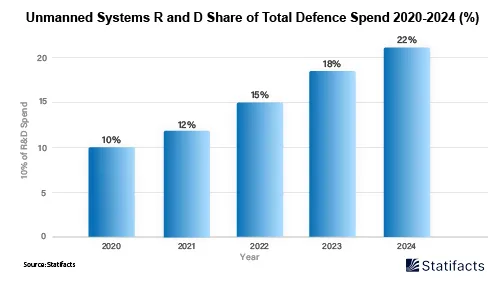
09 July 2025
In June 2025, Lockheed Martin announced the acquisition of Aerojet Rocketdyne for a massive price tag of US$30 billion. This move is another in a long line undertaken by Lockheed to secure control over the United States' hypersonic propulsion supply chain and the development of next-generation defense capabilities. The hypersonic arms race, reminiscent of the space race back in the 20th century, has staple players like Russia but also new entrants such as China. Both of these countries are also investing heavily in hypersonic programs. Lockheed stated that Aerojet’s scramjet prototypes are the main focus of the deal, with the company expected to integrate the proven technology in their Long Range Hypersonic Weapon program, which will go live in 2027.

There is significant interest in hypersonics among firms operating in the American defense sector, with the U.S. Department of Defense now devoting 11% of total defense research and development funds. This funding has gone up from just 4% in 2020. SIPRI data shows that overall U.S. defense R&D spending reached US$ 104 billion in 2024, with US$ 10 billion directed at hypersonics, double the figure from 2021. Aerojet’s new scramjet engine prototypes are said to reduce cycle time by 40%, thanks to digital twin modeling. These were first unveiled after successful testing in 2023.
KPMG’s Aerospace Innovation Monitor also indicates that artificial intelligence-enabled rapid simulation has compressed design timelines by 30%, giving early adopters like Lockheed Martin an unmatched advantage. With this merger, the defense contractor not only gains propulsion IP but also becomes vertically integrated, controlling everything from guidance to launch systems in the hypersonic stack.

There are many variations of passages of Lorem Ipsum available, but the majority have suffered alteration in some form
URL TO BE USED AS REFERENCE LINK:
Placeholder content for this accordion, which is intended to demonstrate the .accordion-flush class. This is the first item's
accordion body.
Placeholder content for this accordion, which is intended to demonstrate the .accordion-flush class. This is the second item's
accordion body. Let's imagine this being filled with some actual content.
Placeholder content for this accordion, which is intended to demonstrate the .accordion-flush class. This is the third
item's accordion body. Nothing more exciting happening here in terms of content, but just filling up the space to make it look, at least at
first glance, a bit more representative of how this would look in a real-world application.
Do you still any question?
Feel free to contact us anytime using our contact form or visit our FAQ page.
Your contact to the Infographics Newsroom
